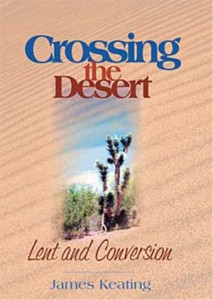Podcast: Play in new window | Download (Duration: 28:08 — 19.4MB) | Embed
Subscribe: Apple Podcasts | Spotify | Amazon Music | Android | Pandora | iHeartRadio | JioSaavn | Podchaser | Gaana | Podcast Index | Email | TuneIn | Deezer | Anghami | RSS | More

The Desert of Consumerism – Crossing the Desert: Lent and Conversion with Deacon James Keating
In this episode, Deacon James Keating and Kris McGregor discuss Lent as a spiritual oasis in life’s desert, where distractions of consumerism often obscure our deeper needs. Deacon Keating reminds us of Lent’s call to surrender to God’s providence, confront loneliness, and find simplicity.
He highlights how modern culture fosters busyness to avoid facing inner realities. Lent offers a chance to deepen relationships, encounter God, and break free from the cycle of distraction and emptiness.
Discerning Hearts Reflection Questions
- Understanding Lent’s Purpose: How does Deacon Keating describe Lent’s intended purpose as an oasis in life’s desert of consumerism and routine?
- Reflection on Cultural Distractions: What insight does Deacon Keating provide regarding the distractions of modern culture and their impact on spiritual awareness during Lent?
- The Paradox of Surrender: Explain Deacon Keating’s perspective on the fear of surrendering to God’s providence and the discomfort it may bring.
- Embracing Simplicity: How does Deacon Keating propose embracing simplicity during Lent can lead to a deeper encounter with God and transformation?
- Confronting Loneliness and Pain: Discuss Deacon Keating’s view on the avoidance of loneliness and pain in modern society, and how Lent offers an opportunity to confront these realities.
- The Invitation to Deepen Relationships: According to Deacon Keating, how does Lent invite individuals to deepen relationships within the Catholic community and experience God’s healing presence?
- Breaking Free from Distraction: Summarize Deacon Keating’s message regarding Lent’s role in breaking free from the cycle of distraction and emptiness perpetuated by consumer culture.
An excerpt from “Crossing the Desert: Lent and Conversion”:
“Lent wants to remind us of our real identity. At first appearance a seeming “obligation,” Lent is actually a great gift. Are we brave enough to enter this desert, and then let it affect us so deeply as to turn us away from sin and false identities, turn us toward communion with the living God? The Church presents this season to us every year because it is hoped that this year will be our year to say “Yes” to Lent’s call to repentance. Lent should not be something we go through alone, but together. As the Hebrews wandered the desert for forty years, so we should enter Lent through the ecclesial community and share its challenges with brothers and sisters in Christ. Lent should not be what the elderly man in the barbershop characterized as “life as usual.” With our goal being moral conversion, let us now turn to see how God can facilitate that conversion when we take on a “lenten mind.”
Keating, James (2012-07-20). Crossing the Desert: Lent and Conversion (Kindle Locations 200-207). Liguori Publications. Kindle Edition.
Deacon James Keating, Ph.D., is a professor of Spiritual Theology and serves as a spiritual director at Kenrick Glennon Seminary in St. Louis, MO.




